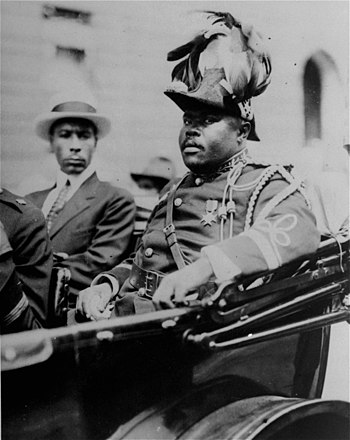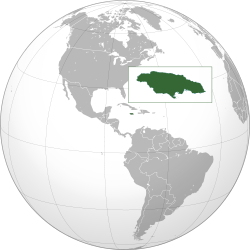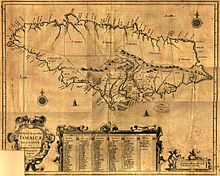The Jamaica Portal
Jamaica (/dʒəˈmeɪkə/ jə-MAY-kə; Jamaican Patois: Jumieka [dʒʌˈmie̯ka]) is an island country in the Caribbean Sea and the West Indies. At 10,990 square kilometres (4,240 sq mi), it is the third largest island—after Cuba and Hispaniola—of the Greater Antilles and the Caribbean. Jamaica lies about 145 km (90 mi) south of Cuba, 191 km (119 mi) west of Hispaniola (the island containing Haiti and the Dominican Republic), and 215 km (134 mi) south-east of the Cayman Islands (a British Overseas Territory). With 2.8 million people,0 Jamaica is the third most populous Anglophone country in the Americas (after the United States and Canada), and the fourth most populous country in the Caribbean. Kingston is the country's capital and largest city. Most Jamaicans are of Sub-Saharan African ancestry, with significant European, East Asian (primarily Chinese), Indian, Lebanese, and mixed-race minorities. Because of a high rate of emigration for work since the 1960s, there is a large Jamaican diaspora, particularly in Canada, the United Kingdom, and the United States. The country has a global influence that belies its small size; it was the birthplace of the Rastafari religion, reggae music (and such associated genres as dub, ska and dancehall), and it is internationally prominent in sports, including cricket, sprinting, and athletics. Jamaica has sometimes been considered the world's least populous cultural superpower. (Full article...) Selected article -The Invasion of Jamaica took place in May 1655, during the 1654 to 1660 Anglo-Spanish War, when an English expeditionary force captured Spanish Jamaica. It was part of an ambitious plan by Oliver Cromwell to acquire new colonies in the Americas, known as the Western Design. Although major settlements like Santiago de la Vega, now Spanish Town, were poorly defended and quickly occupied, resistance by escaped slaves, or Jamaican Maroons, continued in the interior. The Western Design was largely a failure, but Jamaica remained in English hands, and was formally ceded by Spain in the 1670 Treaty of Madrid. The Colony of Jamaica remained a British possession until independence in 1962. (Full article...)Did you know (auto-generated)
Selected biography -Winston Foster OD, (1956 or 15 January 1959) better known by the stage name Yellowman and also known as King Yellowman, is a Jamaican reggae and dancehall deejay. He first became popular in Jamaica in the 1980s, rising to prominence with a series of singles that established his reputation. Yellowman is considered to be one of the genre's pioneers and has been credited with "almost single-handedly [creating] the coarse, crude and fearlessly direct sound of today's dancehall." Spearheading the first generation of dancehall deejays, he brought the genre to an international audience. (Full article...)General images -The following are images from various Jamaica-related articles on Wikipedia.
This is a Good article, an article that meets a core set of high editorial standards.
Maymie de Mena (December 10, 1879 – October 23, 1953, also known as Maymie Aiken or Madame DeMena Aiken in her later career) was an American-born activist who became one of the highest-ranking officers in the Universal Negro Improvement Association (UNIA). She has been credited with keeping the organization alive after Marcus Garvey's conviction for mail fraud and deportation from the United States. De Mena was born into a Creole family in St. Martin Parish, Louisiana, and obtained her education in the United States before marrying a Nicaraguan and moving to Central America. After a decade in which she raised a daughter and taught school, she divorced, returned to the U.S., and joined the UNIA. Quickly rising in the ranks from a translator, because she was fluent in Spanish, de Mena became one of the leaders of the pan-African movement. She was responsible for increasing the membership of the organization in the Caribbean and Latin America. When Garvey was deported from the U.S. to Jamaica, de Mena became Garvey's official representative in New York and was the first woman to carry such a high distinction in the organization. (Full article...)Selected picture - Marcus Garvey was a Jamaican political activist, publisher, journalist, entrepreneur, and orator. The government of Jamaica named him as the country's first National Hero. Pictured is Marcus Garvey in Harlem, New York City in 1922.
Selected cuisines, dishes and foods -Pickapeppa Sauce, also known as Jamaican ketchup, is a brand-name Jamaican condiment, the main product of the Pickapeppa Company, founded in 1921. It is made in Shooters Hill, Jamaica, near Mandeville. The ingredients (in order on the product label) are cane vinegar, sugar, tomatoes, onions, raisins, sea salt, ginger, peppers, garlic, cloves, black pepper, thyme, mangoes, and orange peel, aged in oak barrels. The sauce is sweet, sour, and mildly spicy. The company makes several variants of the sauce, including mango and extra-hot Scotch bonnet pepper varieties. One traditional use of the sauce is to pour it over a block of cream cheese, to be spread on crackers. (Full article...)
More did you know
Selected listsTopicsCategoriesRelated portals
WikiProjectsGeographical:
History and Society:
Tasks
Associated WikimediaThe following Wikimedia Foundation sister projects provide more on this subject:
More portals | ||||||||||




















































